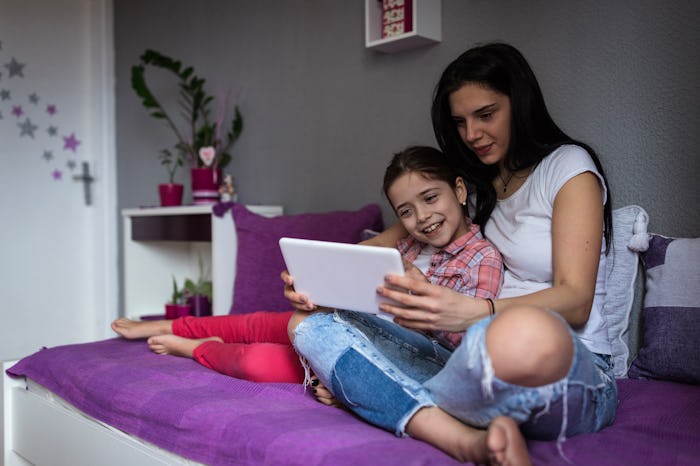Life

Is It Safe To Have Your Babysitter Back? Here's What Experts Say
If you can’t remember the last time your child was more than a stone’s throw away, you’re probably craving some time to yourself right now (or, at the very least, some time to work without trying to keep your little one out of your Zoom call). Maybe you already have a trusted caregiver you haven’t seen since March, and you’re wondering, is it safe to have your babysitter come back?
“There are safe ways to have a nanny or a babysitter,” Gabriela Andujar Vazquez, M.D., infectious disease physician and associate hospital epidemiologist at Tufts Medical Center, tells Romper. Everything carries some risk these days, and unfortunately until there is a vaccine, nothing is 100% safe. Before asking your caregiver back, “make sure your babysitter or nanny has been practicing social distancing, and has had no COVID-19 symptoms for at least ten to fourteen days before returning to work,” Whitney Casares, M.D., pediatrician and author of The New Baby Blueprint: Caring for You and Your Little One, tells Romper.
Once you’ve confirmed that everyone in your household and your babysitter have been feeling fine (no nausea, sore throat, fever, etc.) for at least the past two weeks, the key is to establish clear expectations between the parents and the caregiver. For example, there needs to be totally transparent communication if anyone starts feeling unwell at any time. It’s a good idea to make it clear to your nanny that they should not come to work if they’re feeling even the slightest bit ill. Some people may not want to “let you down” by calling off their shift, so make sure they know that you would much rather have to reschedule your day than risk anyone getting sick. The nanny should also be able to totally trust that you will not have them come if anyone in your house starts to feel unwell.
You and your nanny may have to have some frank conversations about what each of you is comfortable with. They may be wondering if they’ll still get paid (either in full or partially) if either of you have to cancel. What is your policy on pay? What kind of activities are you comfortable with? Are hugs okay? How often will everyone need to wash/sanitize hands?
As far as face masks go, “you may not need a face covering all the time unless that’s what’s needed for both the nanny, and the parents and the kids to feel comfortable,” Dr. Vazquez says. When it comes to food prep, however, Dr. Vazquez says it's definitely a good idea for your nanny to wear a mask. After acknowledging that it can be second-nature to finish a kiddo’s half eaten lunch or snag a bite of their snack, Dr. Vazquez adds "No food sharing!"
If it’s possible, try to have your nanny take your kiddo outside, where the virus seems to transmit less readily, per The New York Times.
“Have your sitter and child do outside activities as much as possible and avoid playdates with other kids when they cannot be conducted according to social distancing guidelines,” Dr. Casares says. This should be fun and easy in the warm summer months when sprinklers, chalk, and popsicles are available.
If you’re trying to decide whether to send your kiddo back to daycare or school or get a nanny, unfortunately there is no black-and-white answer about which is safer.
“Daycares are taking extra measures during the pandemic to assure safety for the children they are caring for, including modifying drop-off and pick-up procedures and screening protocols at daycare arrival, ramping up cleaning and disinfection efforts, and maintaining social distancing strategies,” Dr. Casares says.
As long as you and your caregivers establish a clear protocol for hygiene, face masks, and food prep and have totally open communication if anyone starts feeling off, rest assured that for parents who need relief right now (which is to say, all parents) having a babysitter come over can be a relatively safe (though not totally risk-free) option.
If you think you’re showing symptoms of coronavirus, which include fever, shortness of breath, and cough, call your doctor before going to get tested. If you’re anxious about the virus’s spread in your community, visit the CDC for up-to-date information and resources, or seek out mental health support. You can find all of Romper’s parents + coronavirus coverage here.
Experts:
Whitney Casares, M.D., pediatrician and author of The New Baby Blueprint: Caring for You and Your Little One
Gabriela Andujar Vazquez, M.D., infectious disease physician and associate hospital epidemiologist at Tufts Medical Center